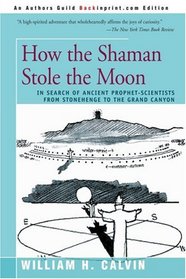Joan G. (despinne) reviewed How the Shaman Stole the Moon: In Search of Ancient Prophet- Scientists from Stonehenge to the Grand Canyon on + 59 more book reviews
I've been studying calendars for close to 10 years. Mythology has a lot to do with calendars and astronomy, among other things. For example, if a Shaman stole the moon, then one might expect to encounter evidence of an eclipse. In another setting, Germany, an eclipse that took place more than 500 years ago is memorialized in the story of the Hare and the Hedgehog, in which case the Hare raced with the Hedgehog for a prize of a gold Louis d'Or (a famous gold coin, also symbolizes the moon or sun) until he fell down and bled to death (moon turns red during eclipse).
So! From this book, I learned how ancient people could track the moon's setting over time: they simply aligned the moon against a space (think windowsill) and watched as it went from right to left-side maximum, then back to right-side maximum. How many years must have been spent before they noticed the moon was moving! This actually takes place over 19 years, a cycle known to the Greeks and called by it's discoverer's name: the Metonic Cycle.
But why trade for a book? You can read this free online at the author's web site:
http://williamcalvin.com/bk6/index.htm
So! From this book, I learned how ancient people could track the moon's setting over time: they simply aligned the moon against a space (think windowsill) and watched as it went from right to left-side maximum, then back to right-side maximum. How many years must have been spent before they noticed the moon was moving! This actually takes place over 19 years, a cycle known to the Greeks and called by it's discoverer's name: the Metonic Cycle.
But why trade for a book? You can read this free online at the author's web site:
http://williamcalvin.com/bk6/index.htm




